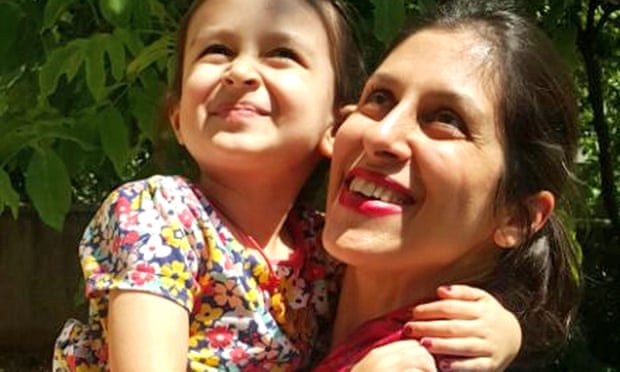Nazanin Zaghari-Ratcliffe: jailed mother ‘traumatised’ by escalating Iran crisis
The British-Iranian mother fears she will be used as a ‘pawn’ by rival powers

A free daily email with the biggest news stories of the day – and the best features from TheWeek.com
You are now subscribed
Your newsletter sign-up was successful
A British-Iranian mother detained in an Iranian jail on contested spying charges fears she may be imprisoned even longer because of the US’s assassination of General Qassem Soleimani.
Nazanin Zaghari-Ratcliffe is being detained in Iran by the Islamic Revolutionary Guard, the branch of the Iranian armed forces that Soleimani led until his death.
Her husband, Richard Ratcliffe, told BBC Radio 4’s Today: “We are held by the [Revolutionary Guard] and obviously they have lost their leader,” The Guardian reports.
The Week
Escape your echo chamber. Get the facts behind the news, plus analysis from multiple perspectives.

Sign up for The Week's Free Newsletters
From our morning news briefing to a weekly Good News Newsletter, get the best of The Week delivered directly to your inbox.
From our morning news briefing to a weekly Good News Newsletter, get the best of The Week delivered directly to your inbox.
“More broadly, part of our campaigning has been to call on Iran to uphold the international law and to respect UN rulings in Nazanin’s case, and that gets a bit harder when international law is played fast and loose with by other parties.”
Zaghari-Ratcliffe told her husband by phone over the weekend that she and around 15 other British and American prisoners believe that they will be used as pawns. They are “scared and traumatised… Everyone is worried,” said Ratcliffe.
Why is Zaghari-Ratcliffe being held?
The 40-year-old mother of one was detained in Iran in April 2016 for allegedly seeking a “soft overthrow” of the Islamic republic. She insists she was only in the country to introduce her daughter to her parents, who live in Tehran.
A free daily email with the biggest news stories of the day – and the best features from TheWeek.com
She is now serving a five-year jail term after being convicted of spying, a charge she denies. Her situation was made worse following a gaffe by the then foreign secretary Boris Johnson, who was forced to apologise in November 2017 for incorrectly telling a Commons committee hearing that Zaghari-Ratcliffe had been teaching journalism in Iran, “something her family and employer say is incorrect”, reports the BBC.
The Independent says the charity worker has never taught journalists in her life and is not even a trained journalist herself, but this did not stop Iranian state media from portraying Johnson’s words as an accidental confession that Zaghari-Ratcliffe was a spy.
What is her current situation?
With tensions rising between Iran and the US-UK, Zaghari-Ratcliffe’s husband says she is now “scared” of being held hostage by Iran and used as a pawn in an escalation of the conflict.
In October last year, Zaghari-Ratcliffe decided to send her five-year-old daughter back to the UK from Iran to start school in London. The child, Gabriella, was 22 months old when her mother was arrested, and she went to live with her grandparents in the Islamic republic. Gabriella visited Zaghari-Ratcliffe in prison every week until her return to the UK.
In a letter to Iranian authorities, Zaghari-Ratcliffe pleaded to be released to go home with her daughter. “I have no hope or motivation after my baby goes…there is no measure to my pain,” she wrote.
But Iranian authorities have kept Zaghari-Ratcliffe in detention and refused to allow her husband a visa to visit Iran.
Zaghari-Ratcliffe has previously gone on hunger strike in protest against being denied medical care. Her husband told The Guardian she had been refused medical treatment for lumps in her breasts, neck pains and “numbness in her arms and legs”, adding she had also been banned from seeing an external psychiatrist.
What is the British Government doing?
Former foreign secretary Jeremy Hunt said at the weekend that the killing of Soleimani risks escalating tensions between Iran and the west through “unintended consequences”, reports The Guardian.
“What we have at the moment is a very dangerous, tinderbox situation. Both sides are underestimating the strength and resolve on the other side… both sides will feel the need to retaliate when they are attacked.”
In March last year, the Foreign Office ramped up pressure on the Iranian government by taking the highly unusual step of granting Zaghari-Ratcliffe diplomatic protection.
Different to diplomatic immunity, diplomatic protection formally elevates a dispute from being a consular matter to being a formal state-to-state issue and “gives a country the right to challenge another state over the treatment of one of its nationals or companies”, says Sky News.
According to BBC diplomatic correspondent James Landale, “British officials had feared that Iran might react negatively to the granting of this new status”.
“Instead, Tehran's first response appears to be the offer of some kind of deal,” he writes.
Foreign Secretary Dominic Raab has described her open letter pleading to be released as “heartbreaking”, and said it “shows the pain and suffering that she and her family are going through”.
“Her callous and cruel detainment for political purposes by the government of Iran is wholly unjustifiable and unacceptable,” Raab said.
“The government of Iran should, as a matter of international law and basic decency, release Nazanin immediately so she can be reunited with her loved ones.”
What are her prospects for release?
Zaghari-Ratcliffe was sentenced to five years in prison in September 2016, giving her a release date in mid-2021.
But her husband says that the further breakdown of relations between Iran and the West following the killing of Soleimani has made it more difficult to convince his wife that her release from Evin jail in Tehran may be imminent.
A potential prisoner swap between Iran and Western allies the UK, US, Germany and Australia was discussed in April last year. Iranian Foreign Minister Javad Zarif said he felt sorry for Zaghari-Ratcliffe and was ready to do a prisoner swap, reports the BBC.
“Let’s have an exchange. I'm ready to do it,” he said.
Iran challenged the US to release an Iranian woman held on “phony charges” in Australia in exchange for Zaghari-Ratcliffe.
Zarif did not name the woman, but The Times says he “is believed to have been referring to Negar Ghodskani, detained in 2017 on a charge of conspiring to export sensitive US communication technology to Iran without a licence, a sanctions violation”.
However, “British diplomats are expected to be cautious about the Iranian offer, especially if it involves an admission that Zaghari-Ratcliffe is guilty of espionage”, The Guardian reported at the time.
There have been no public developments since regarding a potential prisoner exchange.
-
 Political cartoons for February 19
Political cartoons for February 19Cartoons Thursday’s political cartoons include a suspicious package, a piece of the cake, and more
-
 The Gallivant: style and charm steps from Camber Sands
The Gallivant: style and charm steps from Camber SandsThe Week Recommends Nestled behind the dunes, this luxury hotel is a great place to hunker down and get cosy
-
 The President’s Cake: ‘sweet tragedy’ about a little girl on a baking mission in Iraq
The President’s Cake: ‘sweet tragedy’ about a little girl on a baking mission in IraqThe Week Recommends Charming debut from Hasan Hadi is filled with ‘vivid characters’
-
 Local elections 2026: where are they and who is expected to win?
Local elections 2026: where are they and who is expected to win?The Explainer Labour is braced for heavy losses and U-turn on postponing some council elections hasn’t helped the party’s prospects
-
 Witkoff and Kushner tackle Ukraine, Iran in Geneva
Witkoff and Kushner tackle Ukraine, Iran in GenevaSpeed Read Steve Witkoff and Jared Kushner held negotiations aimed at securing a nuclear deal with Iran and an end to Russia’s war in Ukraine
-
 How corrupt is the UK?
How corrupt is the UK?The Explainer Decline in standards ‘risks becoming a defining feature of our political culture’ as Britain falls to lowest ever score on global index
-
 ‘The mark’s significance is psychological, if that’
‘The mark’s significance is psychological, if that’Instant Opinion Opinion, comment and editorials of the day
-
 ‘My donation felt like a rejection of the day’s politics’
‘My donation felt like a rejection of the day’s politics’Instant Opinion Opinion, comment and editorials of the day
-
 How Iran protest death tolls have been politicised
How Iran protest death tolls have been politicisedIn the Spotlight Regime blames killing of ‘several thousand’ people on foreign actors and uses videos of bodies as ‘psychological warfare’ to scare protesters
-
 ‘It may portend something more ominous’
‘It may portend something more ominous’Instant Opinion Opinion, comment and editorials of the day
-
 The high street: Britain’s next political battleground?
The high street: Britain’s next political battleground?In the Spotlight Mass closure of shops and influx of organised crime are fuelling voter anger, and offer an opening for Reform UK